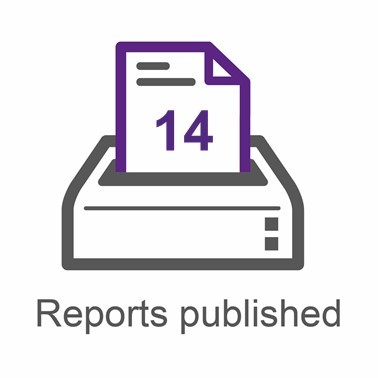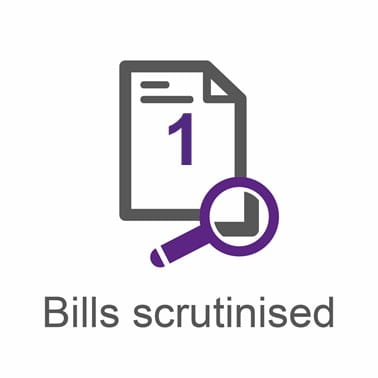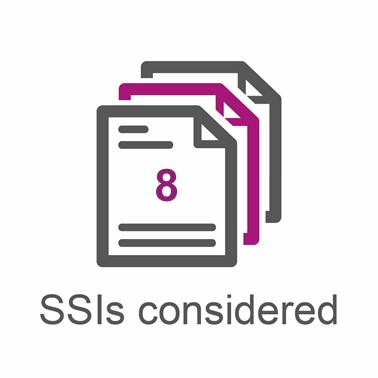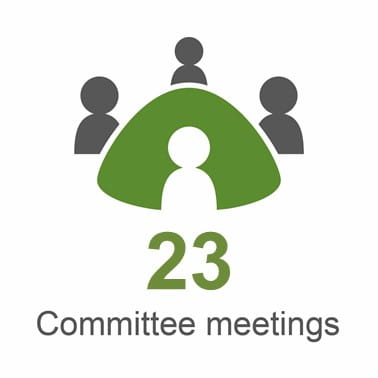Standards, Procedures and Public Appointments Committee
Annual report 2020-21
Introduction
This annual report covers the period of 12 May 2020 to 24 March 2021, after which the Scottish Parliament will go into the campaign recess period from 25 March to 4 May 2021. The Scottish Parliament agreed on 3 March 2021 to vary Standing Orders so that committees could not meet during the pre-election campaign period (with the exception of the COVID-19 Committee, which may be convened in an emergency). This decision was taken in response to the Scottish General Election (Coronavirus) Act 2021 which provides that the Scottish Parliament will not be dissolved until 5 May 2021 to permit the Parliament to meet to legislate for a new polling date if required.
Membership Changes
Previous Members of the Committee during the reporting year
Mark Ruskell MSP (4 September 2018 - 16 September 2020)
Alexander Stewart MSP (25 February 2020- 20 August 2020)
Inquiries and Reports

Resilience of the Scottish Parliament's practices and procedures
Following the introduction of “lockdown” provisions in late March 2020 in response to the COVID-19 pandemic, the Scottish Parliament adapted its practices and procedures through the variation and suspension of some of the Rules in the Parliament's Standing Orders. Since April 2020, the Chamber and Committees of the Parliament met in a mix of virtual, hybrid and socially-distanced formats to ensure that parliamentary business continued.
The Committee sought to evaluate those changes with a view to recommending permanent changes to Standing Orders to ensure that the Scottish Parliament can continue to function as effectively as possible in the context of the ongoing public health situation. The inquiry also considered wider changes to the Parliament's practices and procedures to promote the resilience of parliamentary business in the future.
At its meeting on 18 February 2021 the Committee approved the Standing Order rule changes. The Committee published its report on 23 February 2021.
The Standing Order rule changes were approved by Parliament on 3 March and the majority of the changes will come into force at the beginning of the next parliamentary session. A rule change providing for the temporary amendment of Standing Orders came into effect on 8 March 2021.
Commissioner complaints
The Committee has considered one report from the Commissioner for Ethical Standards in Public Life in Scotland (the Commissioner) in this parliamentary year, which was a complaint against Sarah Boyack MSP.
There were two parts to the complaint.
First, that Sarah Boyack did not include remuneration from her previous employment as the Head of Public Affairs at Scottish Federation of Housing Associations (SFHA) in her Register of Interests.
Second, that she did not declare this remuneration as an interest at a meeting of the Local Government and Communities Committee on 11 September 2019.
The Committee was unanimous in the decisions reached on the complaint. The Committee agreed with the Commissioner's findings in fact. The Committee also agreed with the Commissioner's conclusions—
That the conduct set out in the first part of the complaint was a breach of the Code of Conduct and the Members Interest Act 2006; and
That the conduct set out in the second part of the complaint was not a breach of the Code or the Act.
Standing Order rule changes
In this parliamentary year the Committee identified changes which are required to Standing Orders in order to implement recommendations on the following-
SPCB Urgent Questions
Private and Hybrid Bill Procedures
Public Petitions System
Financial scrutiny of Bills
Equalities and Human Rights' Committee remit
Legislation
Legislation
Bills

Scottish General Election (Coronavirus) Bill
The Scottish Government introduced the Scottish General Election (Coronavirus) Bill to make provision for arrangements for the Scottish general election in response to Covid-19. The election is planned for 6 May 2021. The legislation:
changes the deadline for postal vote applications to give more time to process an expected high level of requests to vote by post
makes “dissolution” (the time before the election when MSPs no longer hold office) last 1 day, allowing the Parliament to make decisions if the election needs to be postponed
gives the Scottish Ministers power to hold an all-postal election and to hold polling over multiple days, if appropriate
allows flexible timing for the first meeting of the new Parliament and the election of a new Presiding Officer
gives a reserve power to the current Presiding Officer to postpone the 2021 election by up to 6 months in certain circumstances
Following the introduction of the Bill the Committee issued a call for evidence and received 36 submissions.
The Committee took evidence at Stage 1 on the Bill at its meeting on 19 November 2020, and published its Stage 1 Report on 26 November 2020.
At its meeting on 17 December 2020 the Committee considered the Bill at Stage 2.
The Stage 3 debate was held on 23 December 2020 and the Bill received Royal Assent on 31 January 2021.
Committee Bills
Scottish Parliament (Assistance for Political Parties) Bill
The Committee's Bill on assistance for political parties completed its passage through the Parliament. The Stage 1 debate took place on 10 September 2020, Stage 2 was held on 3 December and the Bill passed Stage 3 on 2 February 2021. The aim of the Bill was to enable the Parliament to make provision by resolution for payments to registered political parties for the purpose of assisting members of the Parliament who are connected with the parties to perform their Parliamentary duties.
Proposal for a Committee Bill - Complaints against MSPs - Amendment of the Scottish Parliamentary Standards Commissioner Act 2002
The Committee agreed to instruct a Committee Bill to which would amend theScottish Parliamentary Standards Commissioner Act 2002 to address historical misconduct. The Bill seeks to:
remove an admissibility requirement that a complaint be made within one year; and
to allow the Commissioner to investigate complaints in relation to sexual harassment to be made by Members’ own staff who were employed by an MSP directly or as part of a pooled arrangement.
The Committee published its report on a proposal for a Committee Bill on 28 June 2020.
The Parliament debated the Committee's proposal report on 29 September 2020 and agreed to the Committee's proposal to introduce a Bill to giving effect to the policy set out in its report.
The Parliament debated and agreed the Bill at Stage 3 on 4 March 2021.
SSIs

During the Parliamentary year, the Committee considered eight Scottish Statutory Instruments (SSIs), four under the affirmative procedure and four under the negative procedure.
Equalities
In previous years the Committee has been updating the Code in relation to sexual harassment and sexist behaviour. During the course of this work the Committee noted that the Code of Conduct did not cover MSPs' conduct towards the treatment of individuals who do not fall in to certain categories – constituents and people visiting the Parliament for example.
The Committee agreed to update the rules in the Code of Conduct to ensure that MSPs must not behave in a manner towards any individuals they are in contact with in their capacity as MSPs that involves bullying, harassment (including sexual harassment), or any other inappropriate behaviour.
Cross-Party Groups
A total of 104 Cross-Party Groups (CPGs) are now active.
CPGs normally cease to exist at dissolution. The Scottish General Election (Coronavirus) Act means that dissolution will not be until 5 May 2021. The Committee therefore agreed that all CPGs will cease to exist from midnight on 24 March 2021.
In February 2020 the Committee considered an annual monitoring report on Groups' compliance with the Code of Conduct. The Committee agreed to take no action against any Groups who had breached the Code of Conduct due to the restrictions caused by the Coronavirus.
Meetings

The Committee met 23 times during the parliamentary year. 13 meetings were held entirely in private, no meetings were held entirely in public and 10 meetings included items in private.
The items considered in private included the Committee's work programme, consideration of complaints, draft Committee reports and draft Standing Order rule changes.
This year, of the 30 witness appearances, 73% of our witnesses were male and 27% were female. This overall figure includes seven appearances by the Minister for Parliamentary Business and Veterans who was male.